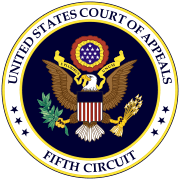Turner v. Driver
Turner v. Driver, No. 16-10312 (5th Cir. 2017), is a 2017 decision of the United States Court of Appeals for the Fifth Circuit that established a First Amendment right to record the police.[2][3][1][4] One of the officers involved was criminally indicted for a similar incident around the same time.[5]
| Turner v. Driver | |
|---|---|
 | |
| Court | United States Court of Appeals for the Fifth Circuit |
| Decided | February 16, 2017[1] |
Background
Philip Turner was standing on the sidewalk, across the street from the police station, videotaping. Several police officers came over, including at least one police car. Turner was questioned about what he was doing. He was then demanded to provide identification, which he refused, citing Texas law which does not require a person to identify themselves unless arrested. According to the complaint, officers put Turner in the back seat of the cruiser, since he refused to give ID, "We're gonna make you sweat," Turner demanded to speak to a supervisor. Sgt. Driver showed up, also requesting Turner's identification which was also refused. After a short period of time, which was not more particularly described, Turner was released.
Decision
The court found that:
We conclude that First Amendment principles, controlling authority, and persuasive precedent demonstrate that a First Amendment right to record the police does exist, subject only to reasonable time, place, and manner restrictions.[2]
References
- "Turner v. Driver". Global Freedom of Expression. Columbia University. Retrieved October 1, 2018.
- Cushing, Tim (February 21, 2017). "Appeals Court Says Filming The Police Is Protected By The First Amendment". Techdirt. Retrieved October 1, 2018.
- Johnson, Stephanie (April 11, 2018). "Legal Limbo: The Fifth Circuit's Decision in Turner v. Driver Fails to Clarify the Contours of the Public's First Amendment Right to Record the Police". Boston College Law Review. 29 (9). Rev. E. Supp. 245
- Kravets, David (February 23, 2017). "Divided federal appeals court rules you have the right to film the police". Ars Technica. Retrieved October 1, 2018.
- Volokh, Eugene (February 26, 2016). "Galveston police officer indicted for searching car of photography rights activist". Washington Post. Retrieved October 1, 2018.